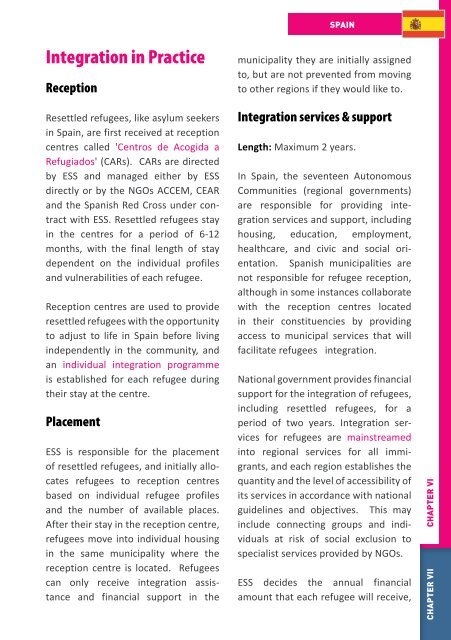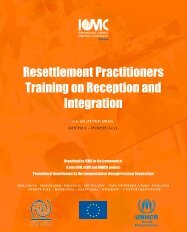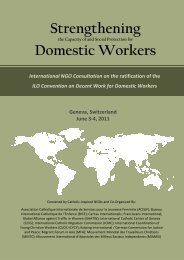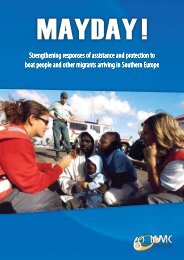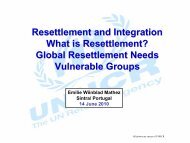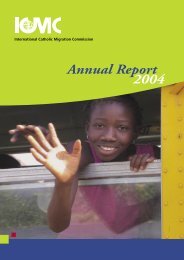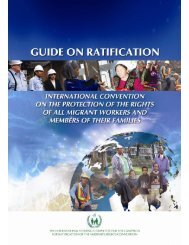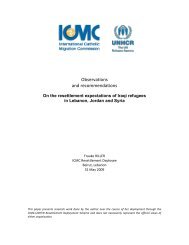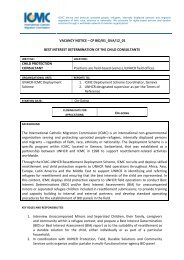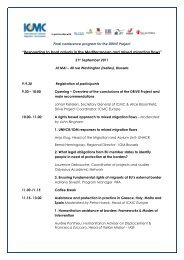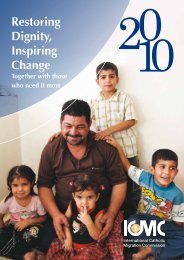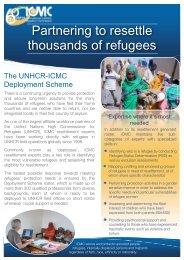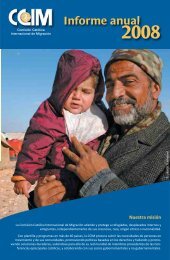ICMCEUROPE WelcometoEurope.pdf (5.89 MB)
ICMCEUROPE WelcometoEurope.pdf (5.89 MB)
ICMCEUROPE WelcometoEurope.pdf (5.89 MB)
Create successful ePaper yourself
Turn your PDF publications into a flip-book with our unique Google optimized e-Paper software.
Spain<br />
Integration in Practice<br />
Reception<br />
municipality they are initially assigned<br />
to, but are not prevented from moving<br />
to other regions if they would like to.<br />
Resettled refugees, like asylum seekers<br />
in Spain, are first received at reception<br />
centres called 'Centros de Acogida a<br />
Refugiados' (CARs). CARs are directed<br />
by ESS and managed either by ESS<br />
directly or by the NGOs ACCEM, CEAR<br />
and the Spanish Red Cross under contract<br />
with ESS. Resettled refugees stay<br />
in the centres for a period of 6-12<br />
months, with the final length of stay<br />
dependent on the individual profiles<br />
and vulnerabilities of each refugee.<br />
Reception centres are used to provide<br />
resettled refugees with the opportunity<br />
to adjust to life in Spain before living<br />
independently in the community, and<br />
an individual integration programme<br />
is established for each refugee during<br />
their stay at the centre.<br />
Placement<br />
ESS is responsible for the placement<br />
of resettled refugees, and initially allocates<br />
refugees to reception centres<br />
based on individual refugee profiles<br />
and the number of available places.<br />
After their stay in the reception centre,<br />
refugees move into individual housing<br />
in the same municipality where the<br />
reception centre is located. Refugees<br />
can only receive integration assistance<br />
and financial support in the<br />
Integration services & support<br />
Length: Maximum 2 years.<br />
In Spain, the seventeen Autonomous<br />
Communities (regional governments)<br />
are responsible for providing integration<br />
services and support, including<br />
housing, education, employment,<br />
healthcare, and civic and social orientation.<br />
Spanish municipalities are<br />
not responsible for refugee reception,<br />
although in some instances collaborate<br />
with the reception centres located<br />
in their constituencies by providing<br />
access to municipal services that will<br />
facilitate refugees integration.<br />
National government provides financial<br />
support for the integration of refugees,<br />
including resettled refugees, for a<br />
period of two years. Integration services<br />
for refugees are mainstreamed<br />
into regional services for all immigrants,<br />
and each region establishes the<br />
quantity and the level of accessibility of<br />
its services in accordance with national<br />
guidelines and objectives. This may<br />
include connecting groups and individuals<br />
at risk of social exclusion to<br />
specialist services provided by NGOs.<br />
ESS decides the annual financial<br />
amount that each refugee will receive,<br />
CHAPTER VI<br />
CHAPTER VII


